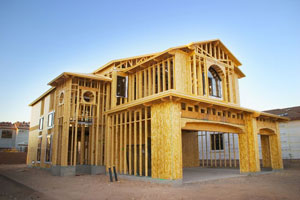Understanding the VA Construction Loan Process
By Steven Roberts Updated on 7/20/2017
The U.S. Department of Veteran Affairs (VA) allows eligible military borrowers to acquire a VA mortgage loan to fund the purchase of both existing and new home constructions. Consider the following factors for VA Construction Loans and the process of constructing a home with VA funding.
When financing the construction of a home through a VA mortgage loan, banks may impose additional requirements. They may do this by raising the minimum down payment up to 20% to cover the associated risks. While this may seem to undercut VA guidelines, the banks ultimately assume the risk of lending and thus set the minimum standards for borrowers.
VA Construction Loan Process
Applying for a VA construction loan follows the same general process as applying for a standard VA Mortgage for a home purchase. Prior to all lending considerations, you must satisfy VA eligibility requirements. You must also obtain a VA Certificate of Eligibility and fill out a VA loan application.
Once approved for a VA Mortgage Loan, your funds will be disbursed to purchase the land where the prospective property will be constructed. Afterward, the remaining funds will be transferred to an escrow account from which the builder will be paid. When withdrawing funds for payments from the escrow account, the lender will require your written permission.
Make VA Construction and Mortgage Payment
Unlike the traditional payment schedule of VA Mortgages, payment for VA Construction Loans vary depending on whether the purchase was of an existing property or a new construction. In the former case, you'll begin mortgage payments immediately. For the latter, you won't be required to make a payment until construction is complete.
Payments for VA construction loans differ in that you will be responsible for the mortgage payments that accrue during the home construction. However, payments will begin at a later date.
For instance, if your home construction takes 12 months to finish, you must pay an adjusted monthly mortgage to compensate for the time that the mortgage was unpaid during home construction. Alternatively, you may elect to pay a balloon payment at the end of the loan term to cover the deficiency.
Either way, you can prepare for these payments by depositing mortgage payments into savings during the construction phase. Once the home is finished and payments start, you'll already have money in reserve and will not risk falling behind because of the high-interest rates or a balloon payment.
Find a VA Construction Loan Lender
Use online resources to find a VA Construction Loan lenders in your area.
If you are seeking a VA Construction Loan Lender, visit our Find a Lender page. Select the applicable field, and you will be directed to a reliable lender.
Find a Builder
Constructing a new home with a VA loan often depends on finding the right builder for the project. Typically, builders will begin construction prior to even locating a buyer, often referred to as “spec building” or speculation. This requires a large investment of builder time and money, the profit from which depends on whether the home will eventually sell for greater than the expense of construction. With many builders taking substantial losses during the housing crisis, VA borrowers can alleviate these builder risks by committing to a home construction project, thus giving the builder the incentive to cut a deal.
Make an Offer
When making an offer to a builder with a VA construction loan, follow these four simple steps:
Get Pre-Approved
Apply for VA loan pre-approval before starting negotiations. With pre-approval, you'll demonstrate to the builder you commitment to the project and your ability to qualify for the home purchase. In addition, you borrowers may also provide the builder with the contact information of the VA loan officer to further facilitate serious negotiations and for additional information if necessary.
Offer a Down Payment
After approaching a builder, you'll put a reasonable amount for the new home’s down payment. While making a sufficient down payment will illustrate a serious commitment to the agreement, you should avoid paying too much. Rather, use your pre-approval as justification for making a smaller down payment and as proof of commitment. If necessary, contact a qualified Realtor or real estate attorney for assistance during these negotiations.
Use Your Land to Your Advantage
If you own the land outright or have an adequate amount of equity accumulated, you'll have an advantage for bargaining with the builder. However, if you negotiate using the equity within the land, you should always consult a legal expert in order to ensure that everything proceeds smoothly and legally.
Negotiate Interest Payments
During negotiations, another topic that will most arise is who should pay the interest which accumulates while the home is being constructed. In general, the home buyer pays the cost of interest during home construction and should offer to pay these expenses as an incentive for the builder. If that's your plan, check the cost of home construction to ensure that they are not being billed twice. If all goes according to plan, you may be able to reduce the overall home price for the purchase.
VA Construction Loan without Land
If you don't own the land for home construction, you may find the process somewhat simpler. Look for ongoing projects in your desired area. Then secure a VA Construction Loan to complete the project to build your home. Remember, the ultimate goal of these negotiations is to provide an incentive for the builder and minimize the risk that he or she assumes in order to facilitate a deal.
Choosing an Existing Construction Home
You should generally choose a home that is early in the process of construction, ideally immediately after the groundbreaking. By choosing a less constructed home, you'll have more opportunities for making custom choices to the design and layout. Although the builder may request funds for the cost of any design alterations, these expenses will usually be less overall than the cost of the 20% down payment.
Get a Quote for a VA Loan
If you would like to secure a VA home loan, visit our Get a Quote page to receive an interest rate quote from lenders in your area.

Didn't find the answer you wanted? Ask one of your own.
-
 VA Loan Information
View More
VA Loan Information
View More
-
 Can I get a VA Loan after Short Sale or Foreclosure?
View More
Can I get a VA Loan after Short Sale or Foreclosure?
View More
-
 Comparison: VA Loans Versus Conventional Mortgages
View More
Comparison: VA Loans Versus Conventional Mortgages
View More
-
 Benefits of Refinancing With a VA Mortgage
View More
Benefits of Refinancing With a VA Mortgage
View More
-
 VA Loan Modification
View More
VA Loan Modification
View More
-
 Approval of VA Lenders
View More
Approval of VA Lenders
View More
-
 VA Loan Forgiveness - Debt Forgiveness for U.S. Veterans
View More
VA Loan Forgiveness - Debt Forgiveness for U.S. Veterans
View More
-
 VA Loan Down Payment
View More
VA Loan Down Payment
View More
-
 Securing a VA Business Loan
View More
Securing a VA Business Loan
View More
-
 VA Loan Benefits
View More
VA Loan Benefits
View More
-
 VA Loan Appraisals and Home Inspection
View More
VA Loan Appraisals and Home Inspection
View More
-
 Understanding the VA Loan Application Process
View More
Understanding the VA Loan Application Process
View More
-
 5 Common Obstacles to VA Home Inspection
View More
5 Common Obstacles to VA Home Inspection
View More
-
 VA Loan Closing Costs
View More
VA Loan Closing Costs
View More
-
 What is VA Funding Fee?
View More
What is VA Funding Fee?
View More
Get a Free Quote! Get a VA Loan!
Related Articles
Ask our community a question.
Searching Today's Rates...

Featured Lenders
Lisa Stepp
RBS Citizens
Clifton Park, NY
Kat Whitman
Whitman Met, Inc.
Sacramento, CA
Cameron Burke
Vision One Mortgage
Huntington Beach, CA

